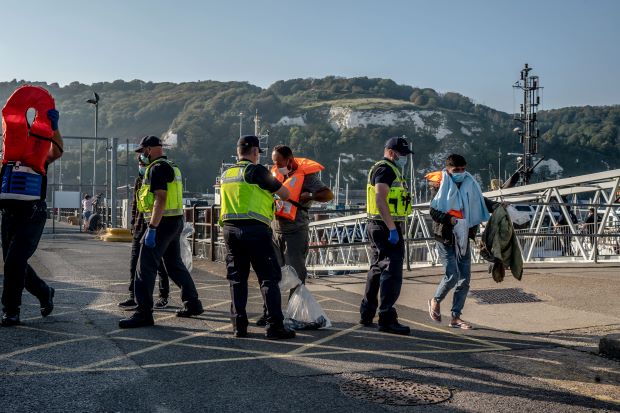Britain prepares to send asylum-seekers to Rwanda

By Stephen Castle and Abdi Latif Dahir
LONDON — A British government plan to send some asylum-seekers to Rwanda led to another day of legal wrangling Tuesday (14), as a small number of them waited to hear if they would be aboard a jet bound for Africa later in the day.
Originally, dozens of people who had arrived in Britain from France were scheduled to be on the flight that was expected to leave Tuesday night, though that number is thought to have been whittled down to around six by legal challenges.
Several of those cases were being heard on Tuesday, raising the prospect that the passenger list could dwindle further. In fact, one refugee aid group, Care4Calais, said on Tuesday night that the European Court of Human Rights issued an order to stop the deportation of one man scheduled to be on the flight and said it was hopeful for the others.
But the government still says it wants the plane to take off even with only a handful on board, despite the cost estimated by the British news media at as much as 500,000 pounds, or about $600,000, and in spite of protests, including from church leaders.
On Tuesday afternoon, the flight was still on track to leave Britain after the country’s Supreme Court refused to agree to stop the deportation of asylum-seekers before a case against the government is heard in full next month. The government, however, promised that the claimant in the case would be returned to Britain if a future challenge proved successful.
Care4Calais is just one of several groups involved in appealing the deportations this week. Other groups included the Public and Commercial Services Union, which mainly represents government employees or contractors; and another aid group, Detention Action, which has also helped asylum seekers. Their appeals were meant to block individual asylum seekers from being forcibly removed before a full legal hearing about the policy takes place in July.
“We’re in a situation where the legality of this is yet to be tested,” said Mark Serwotka, the union’s general secretary. “If the government had any scruples about these people, or any shred of humanitarianism, they would not deport anyone, until it was found in a court whether the process itself is legal.”
He added that it was now “entirely possible” that those who were deported would “need to be brought back” to Britain if their removal was deemed illegal at the subsequent hearing in July.
Asked whether a largely empty flight would serve any purpose, Prime Minister Boris Johnson said Tuesday that he had predicted there would be “plenty of legal challenges, there will be bumps on the road.” But he described the partnership with Rwanda as a sensible one, and claimed that his opponents had no alternative to the policy.
Detention Action said that one of its clients, a Vietnamese national, also had his appeal dismissed. “We are deeply concerned for the safety and rights of our client — who initially sought asylum in Ukraine and fled to the UK from Putin’s war,” it said in a statement. “He does not speak English, and the home secretary has failed to provide assurance that there will even be a Vietnamese interpreter on hand to help him in his asylum claim.”
The arrival of a small but steady number of asylum-seekers on boats from France has been a growing political problem for Johnson, who in 2016 led the campaign for Britain to leave the European Union, arguing that it would allow the country to “take back control” of its borders.
Relations with the French government have been tense after Brexit. And, with limited cooperation with French authorities, Johnson’s government has searched for other ways to curb the arrivals that have become an embarrassing symbol of Britain’s failure to police its post-Brexit frontiers.
The British government announced in April that it had reached a deal with Rwanda that would allow the processing and settling of asylum-seekers in the African country. In return, Britain would pay Rwanda 120 million pounds for economic development programs.
The deal has provoked fierce opposition in Britain for being unworkable and unethical, including from religious figures, civil servants and — according to the Times of London — from Prince Charles, heir to the British throne.
Critics accuse Johnson, who narrowly survived a vote of no confidence last week, of deliberately stoking the issue for political advantage. They argue that even if very few asylum-seekers are deported, the policy is intended to send a signal to voters that Britain is tough on those seeking to enter Britain by crossing the English Channel, many of them in small boats.
Liz Truss, Britain’s foreign secretary, told the LBC radio station that the flights should be seen in the larger context of illegal migration and of criminal gangs making money from bringing migrants into Britain.
The government, Truss said, needed to ensure “that if they are not on today’s flight, they are on subsequent flights. But fundamentally, we need to break the business model, and that is why we have to take this action.”
The debate over the Rwanda asylum plan comes at a time when immigration into Britain from non-European Union countries continues to rise.
Critics of the government say that British policy effectively criminalizes those who are trying to claim asylum, making it impossible for most genuine refugees to enter the country legally.
-New York Times

